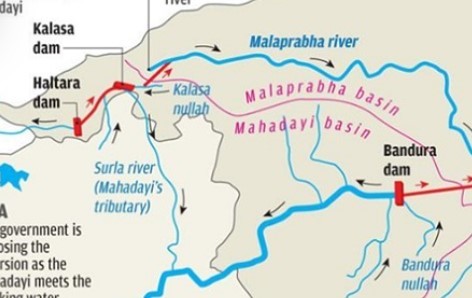Description

Disclaimer: Copyright infringement not intended.
Context
National Wildlife Board defers decision on Karnataka's Kalasa-Bhanduri project.
Details
Kalasa-Banduri Project
- The Kalasa-Banduri Project of the Karnataka government proposes to divert Mahadayi river water into the Malaprabha river in the state to enhance drinking water supply to Dharwad, Belagavi, Bagalkote, and Gadag districts.
- The project was first proposed in the 1980s, but it has yet to be implemented due to a dispute between Karnataka, Goa, and Maharashtra.
Issue
- The Mahadayi river flows through Karnataka and Goa before joining the Arabian Sea. Known as Mandovi in Goa, it is one of the two major rivers of the western state.
- The diversion of Mahadayi water has been a point of contention between Karnataka and Goa, with the latter claiming it would strip the state of its flora and fauna.
- This project had been on paper for decades and the Karnataka government decided to implement. Clearance for the project was received from the center in 2002.
- The project however, soon ran into trouble when the then government of Goa headed by raised objections to the project claiming that the project would harm Goa's flora and fauna. Following this, the then National Democratic Alliance (NDA) government which was in power at the center put on hold its approval and funding of the project.
- Karnataka and Goa have since then been at loggerheads over the project.
- In September 2006, the government in Karnataka decided to go ahead with the construction work.
- The Goa government, however, soon moved the courts and brought a stay on the construction work. The matter is now before the Mahadayi Water Disputes Tribunal.
Tribunal’s Award
- In 2018, the tribunal awarded 13.42 TMC of water from the Mahadayi river basin to Karnataka, 1.33 TMC to Maharashtra, and 24 TMC to Goa. Of Karnataka’s allocation, 5.5 TMC was allocated for drinking water and 8.02 TMC was allocated for hydroelectricity generation.
- Of the 5.5 TMC allocated for drinking water, 3.8 TMC was to be diverted to the Malaprabha basin through the Kalasa and Banduri Nalas (canals). This decision was notified by the Central government in February 2020.
.jpg)
Issues with the Tribunal’s Award
- Goa has filed a Special Leave Petition in the Supreme Court challenging the allocation of water from the Mahadayi by the tribunal. In October 2020, it also filed a contempt petition accusing Karnataka of illegally diverting water from the river. Maharashtra has also filed civil appeals in the dispute.
Recent issue
- The National Board for Wildlife (NBWL) has deferred the decision on diverting forest land from the Kali and Sahyadri tiger reserves for the construction of a part of the Karnataka government's Kalasa Nala water diversion scheme.
- The Standing Committee of NBWL discussed the issue in a meeting on January 30.
- The state government sought the diversion of 10.68 hectares of forest land from the tiger corridor between the Kali and Sahyadri tiger reserves for the construction of a diversion weir, jack well-cum-pump house, and an electrical substation, as well as laying a pipeline and power line for the Kalasa Nala Diversion Scheme in Khanapur Taluk of Belagavi district.
- The Standing Committee was informed that the chief wildlife warden of Karnataka, the State Board for Wildlife, and the state government had recommended the proposal.
- The National Tiger Conservation Authority (NTCA) mentioned that the matter is sub-judice and, therefore, did not provide any comment on it.
- The Standing Committee decided that comments on the proposal should be sought from the NTCA in accordance with the provisions of the Wildlife (Protection) Act, 1972. Accordingly, the proposal was deferred for the next meeting.
National Board for Wildlife (NBWL)
- National Board for Wildlife is a statutory Board constituted officially in 2003 under the Wild Life (Protection) Act, 1972.
- The NBWL is chaired by the Prime Minister and is responsible for promotion of conservation and development of wildlife and forests.
- The board is ‘advisory’ in nature and can only advise the Government on policy making for conservation of wildlife.
- It is an important body because it serves as an apex body for the review of all wildlife-related matters and for the approval of projects in and around national parks and sanctuaries.
- The standing committee of NBWL is chaired by the Minister of Environment Forest and Climate Change.

Conclusion
Water disputes in India represent a complex and multifaceted challenge, influenced by factors such as population growth, urbanization, agricultural demands, climate change, and interstate rivalries. Addressing these disputes requires a comprehensive approach that integrates sustainable water management practices, equitable distribution mechanisms, effective governance frameworks, and robust interstate cooperation. With concerted efforts at both the policy and grassroots levels
|
PRACTICE QUESTION
Constitutional mechanisms to resolve the inter-state water disputes have failed to address and solve the problems. Is the failure due to structural or process inadequacy or both? Discuss.
|













